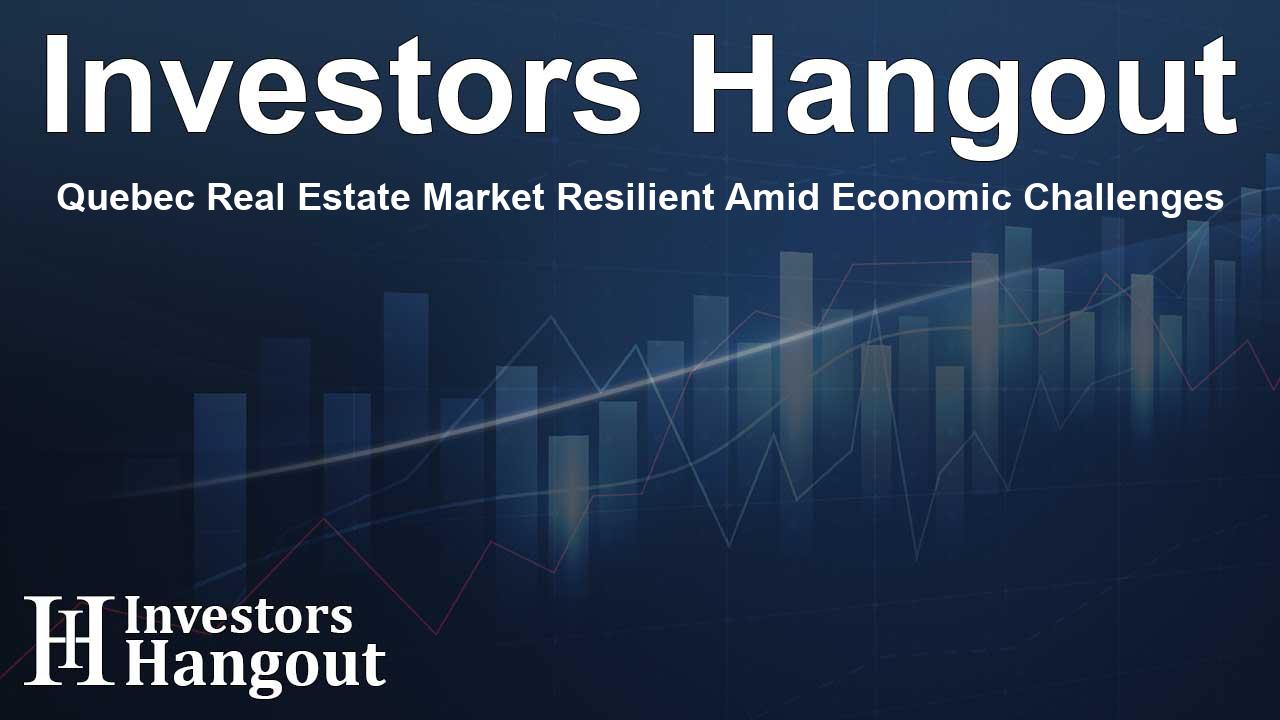Quebec Real Estate Market Resilient Amid Economic Challenges

Quebec Real Estate Market Overview
In recent times, the residential real estate market in Quebec has offered a surprising robustness even amid significant economic challenges. The latest statistics reveal that from July through September, the region experienced a noteworthy increase in property transactions. This data, freshly compiled by the Quebec Professional Association of Real Estate Brokers (QPAREB), shows that the market is navigating complex economic waters with impressive dexterity.
Market Resilience in a Turbulent Economy
Despite the evident strains in the broader economy, which includes a declining GDP, rising unemployment, and a significant uptick in living costs, the real estate market in Quebec has not only survived but thrived. The Bank of Canada’s recent interest rate adjustments may have played a pivotal role in fueling more active transactions, further supporting the market's performance.
Transaction Volumes and Trends
Statistically, the third quarter of 2025 recorded the sale of 22,690 residential properties, marking an 11% increase compared to the same timeframe the previous year. This surge in sales reflects the highest activity since 2020 and is a clear indication of a healthy market. Moreover, growth was observed across nearly all regions within Quebec, highlighting a statewide trend of increased demand for properties.
Price Dynamics in Quebec Real Estate
Interestingly, while there have been fluctuations, the trend of moderate price increases remains apparent across various property types. According to Hélène Bégin, a Senior Economist with QPAREB, the demand for homes—particularly from repeat buyers—coupled with a notably lower supply of available homes has put upward pressure on prices. This scenario resonates particularly within the plex segment, which has demonstrated pronounced growth in both sales and prices. Buyers are increasingly viewing income properties as viable investments to counterbalance the impact of higher borrowing costs.
Sellers' Market Characteristics
As supply dwindles, Quebec’s real estate dynamics have shifted decidedly in favor of sellers. With a persistent inventory shortage, many regions within the province face acute shortages of homes for sale. This inventory challenge compels potential buyers to act swiftly, often leading to quicker sales. In fact, current statistics indicate an average of just 44 days for single-family homes to sell, reflecting a positive trend in property movement compared to previous years.
Regional Sales Highlights
The sales figures provide a closer look at how different markets are performing within Quebec. Notably, plexes witnessed a remarkable 24% increase in sales, with single-family homes following at a 12% rise. Despite some areas experiencing slight declines, the overall positivity across major urban centers illustrates a buoyant market.
Inventory Analysis Across Quebec
Examining inventory levels, the third quarter reported 36,117 active listings—comparable to last year but still significantly below the typical 20-year average, which is about 51,000 properties. This undersupply is evident across various urban centers, enhancing competition among buyers. For instance, while condominium listings grew, the inventory of single-family homes and plexes saw reductions, further compacting the market.
Price Increases and Market Valuations
The competition among buyers has catalyzed a steady increase in median prices. Single-family home prices rose to $490,000, while plexes surged to $650,000. The growth observed across property categories inspects the continued sellers' advantage, reinforcing the negotiation position for those listing properties in this robust market. Highest gains in prices were noted in several metropolitan areas, with certain markets showing significant upticks in the median prices of properties.
Current Market Conditions and Future Outlook
As we assess the ongoing conditions within Quebec’s real estate landscape, it becomes apparent that the market benefits all stakeholders—sellers, buyers, and investors alike. In light of these dynamics, vigilance and adaptability among real estate professionals and clients will remain vital as the market evolves. With strong fundamentals backing the current trends, the real estate sector in Quebec appears set for sustained activity, making it an essential focus for anyone interested in the property market.
Frequently Asked Questions
What is the current trend in Quebec's real estate market?
The current trend indicates significant resilience, with an 11% increase in transactions compared to last year, showcasing buoyant market activity.
What factors are influencing the price increases in Quebec?
Price increases are largely driven by a combination of steady demand from repeat buyers and a low supply of available properties.
How long does it typically take to sell a property in Quebec?
On average, it takes about 44 days to sell a single-family home, which is considerably faster than the previous year.
What is the average price of a single-family home in Quebec?
The median price of single-family homes has risen to approximately $490,000 in the current quarter.
How is the market split between sellers and buyers?
The market heavily favors sellers due to a persistent shortage of inventory, putting pressure on buyers to act quickly.
About The Author
Contact Logan Wright privately here. Or send an email with ATTN: Logan Wright as the subject to contact@investorshangout.com.
About Investors Hangout
Investors Hangout is a leading online stock forum for financial discussion and learning, offering a wide range of free tools and resources. It draws in traders of all levels, who exchange market knowledge, investigate trading tactics, and keep an eye on industry developments in real time. Featuring financial articles, stock message boards, quotes, charts, company profiles, and live news updates. Through cooperative learning and a wealth of informational resources, it helps users from novices creating their first portfolios to experts honing their techniques. Join Investors Hangout today: https://investorshangout.com/
The content of this article is based on factual, publicly available information and does not represent legal, financial, or investment advice. Investors Hangout does not offer financial advice, and the author is not a licensed financial advisor. Consult a qualified advisor before making any financial or investment decisions based on this article. This article should not be considered advice to purchase, sell, or hold any securities or other investments. If any of the material provided here is inaccurate, please contact us for corrections.
